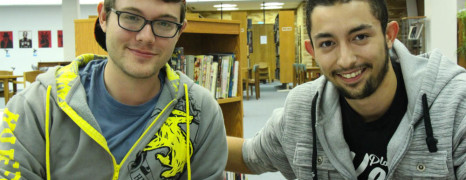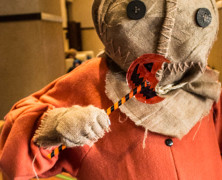Storming the Beaches With Logos in Hand preformed at Ghost on November 7. The band, composed of SFUAD alumni, played to a full house at the intimate Santa Fe venue. The night began with an opening performance by May the Peace of the Sea Be With You, a touring band from Arkansas. After a brief intermission Storming the Beaches with Logos in Hand began by playing new unreleased material before playing songs from their album, Southwick...
Winter Wonderland
posted by Kyleigh Carter
Santa Fe’s first big snow hopefully heralds the winter ahead.
Shoot the Stars® Season Four
posted by Franco Romero
Shoot the Stars ® season four has begun at SFUAD. Two screenplays were selected from student submissions, and are now in the process of being turned into films that will feature professional acting talent.
Santa Fe Comic Con
posted by Christy Marshall
Comic Con is a convention for pop culture enthusiasts. Santa Fe has had one for two years now, most recently on Oct. 24-26 at Buffalo Thunder Resort and Casino. People came to share in their love of pop culture through dressing up and interacting with guest celebrities and local artists....
Charlotte Martinez Takes Over The Screen
posted by Franco Romero
SFUAD alumni and former Jackalope writer Charlotte Martinez graduated last May with a double major in Film and Creative Writing. After working at The Screen for several years, Martinez has recently taken over as general manager. Martinez sat down with Jackalope magazine this week to talk about her new job, her experience in Jackalope and writing after graduation.
Jackalope Magazine: How exactly did you end up in this position, as General Manager?
Charlotte Martinez: I’ve been working at The Screen since I was, I think a sophomore. And Peter Grendel, who used to be the general manager here, he hired me when I came in to write, I’ll never forget this, I came in to write a review about one of the movies he played here. It was the first time I’d watched a movie here. Obviously I knew of The Screen, being a student here, but I had never actually gone in and watched a movie. So I went in and said, ‘I’m going to write this review,’ and he said, ‘hey, we need people to work here! Would you like to work here?’ (Laughs). So that was what, four years ago? I’ve worked here every year since, and me being the oldest employee, I guess it just made sense for him to ask me to take over management when he went to the Violet Crown, which is what happened. He took over general management.
JM: Will you describe your experience so far, managing The Screen?
CM: I mean, it’s one screen, so unlike let’s say Regal or even Violet Crown that have multiple screens to manage, it’s not terribly difficult. But it’s also not easy because it’s running a business and I’ve never done that before, you know? I mean, I just graduated in May but I knew The Screen really well and I knew how to work it so I think it made sense for me to step in as manager and do what I had been doing essentially. Except, with an office.
JM: How do you think SFUAD and your education here prepared you for this type of position?
Charlotte Martinez stands in front of Main doors of the The Screen. Photo by Jason Stilgebouer.
Charlotte Martinez stands in front of Main doors of the The Screen. Photo by Jason Stilgebouer.
CM: Hmm. I thought out of all the classes I took here, Jackalope was actually the most integrative. I mean, you’re forced to talk to people. Just going to do an interview is huge, and I mean socializing and everything. But I don’t know anything about running a business. Essentially, I’ve been learning all of this as I go, but I think being able to talk to people and being able to write something? I mean, it’s amazing, especially in New Mexico, just to write something really well and really professionally is a huge deal. So now that I know how to do that, I can communicate with everybody or anybody in this industry and make it sound like I know exactly what I’m talking about.
JM: Would you say then that being in Jackalope, and by extension Creative Writing, gives students skills they will use in a career?
CM: Definitely! And film too, don’t get me wrong. I mean this is a movie theater. I know about production, I know how distribution works now. I didn’t know anything about distribution, because I mean, we don’t learn that here. It’s all about making a movie, this is all about showing movies.
JM: What sort of crowd does The Screen attract, and what kinds of films are shown here?
CM: That’s a good question! Ever since I’ve worked here, it’s so funny because our patrons are the senior citizens of Santa Fe. I wouldn’t have guessed that when I first started working here. I’m like, ‘Oh cool, foreign, independent, it’s all very exotic.’ And what I found was the older crowd crowd coming in. I thought, ‘maybe that’s just this year.’ But no, that’s exactly who loves these sort of movies! They’re so fed up with blockbuster stuff. They are, they’re just like, ‘we won’t go to Regal to see another explosion, to see another Marvel movie,’ you know, it’s so predictable. And it makes sense, because that’s sort of our generation’s thing. They need a real quote-unquote ‘movie,’ and they think that’s independent and foreign cinema. Which it is, because they are essentially looking at the basics of film making still, where as blockbuster is more, you know, young person based.
The Screen empty hours before a movie starts. Photo by Jason Stilgebouer.
The Screen’s empty hours before a movie starts. Photo by Jason Stilgebouer.
JM: Modern blockbuster does seem to have a formula to it.
CM: It does! And this is the formula for the seniors. And it works out, because they really like it here.
JM: Do you think they are drawn to it also because it is so small, and the crowds aren’t as big?
CM: Oh, heck yeah. I mean that’s the first thing they say when they come in, they say they love this environment. It’s very homey, it’s very comforting. We know most of the patrons’ names when they come in and they know ours. It feels very small-town.
JM: Do you have a favorite genre out of the films which are shown here?
CM: Good question. I have to confess, I didn’t even realize this until last year. I really like war stories, and actually like reading war stories too. We played a movie called Phoenix here a while ago. German produced and it didn’t take place during a war, it was post-war, but it was still so well-done and I watched it three times just to analyze it. I find myself analyzing more war movies than anything else. I’m not sure that’s a genre, but if you tell me that it’s a war movie, or if it’s under that category, then I’ll watch it.
JM: I would assume you work closely with the film professors. How is the experience of helping them organize classes?
CM: Yeah, that’s true. That’s great too because I get to see my professors! And then if I ever have questions for them, you know. They’re really nice about coming into my office and giving me the answers still. It’s still that student-teacher relationship except it’s not because I’m technically faculty. But I still get to see them every day!
JM: You get to keep learning from them, even though you are no longer a student?
CM: Exactly. I wish I could have some sort of setup like that with Creative Writing as well.
JM: Is there anything in particular you missed about Creative Writing? Tell me about your time in the program.
SFUAD’s on campus movie theatre. Photo by Jason Stilgebouer.
SFUAD’s on campus movie theatre. Photo by Jason Stilgebouer.
CM: I always loved it. I think the staff was really consistent while I was there. I had Dana [Levin] a couple times and Matt [Donovan] I had a couple times, Julia [Goldberg] I had almost every year. I think that connection and the fact that this is such a small school made the writing department amazing. The professors got to know your work so they were really pressing down on it, where as any other university, they would probably be like, who are you again?
JM: You had a double major in Creative Writing and Film. Why both? Did you lean more toward one or the other while you were in school here?
CM: I went here first when it was the College of Santa Fe. I was always interested in the arts but I liked creative writing a lot more at that point. But then creative writing was this thing where you probably didn’t have a career afterwards and that scared me and it scared my family, so we said, ‘OK, what can we do to make sure you have an income?’ I said, ‘oh, I’ve always been interested in visual. In film making.’ So when the school re-opened I asked, ‘would it be impossible to do a double major?’ And they said ‘well, no. We’ve only had one other person and they didn’t finish, but give it a try.’ So I signed up right away my freshman year, taking both the creative writing and then the film classes. Both of which I really enjoyed by the way, but creative writing was my first love.
JM: You were mostly writing fiction, correct?
CM: I was only writing fiction until Julia Goldberg was like, ‘come join Jackalope!’ I miss it.
JM: Did you do screen writing as well?
CM: Well the curriculum here is that you try it all first, then maybe your junior or senior year you start to narrow in on what you’re interested in. I started off learning production, pre-production, post-production. You do the camera, you do script writing, you do everything, but I did enjoy screen writing more than anything. So yeah, it worked out pretty nicely!
JM: I enjoyed your piece that won for Glyph last year. Is the rest of your work similar?
CM: Yeah, I guess so. During my senior year, I really started exploring the story of my roots. The southwest and being Hispanic or being Native. It’s funny that you bring that up because my last year was really cultural-based, and I didn’t mean for it to be but it sort of turned out that way.
JM: Are you still writing?
CM: The last thing I wrote was a feature for The Reporter on small businesses and that was really fun, but I can’t be working for the Reporter if this is a daily job. But you know, I’m still writing for myself. I say, ‘one of these days this novel will be published. Obviously this short story will go somewhere.’
JM: I would imagine it’s nice to still be in a place of creativity, even if you don’t have as much time for your work.
CM: Totally! I thought it would be weird to stick around the university, because I was here for five years. It took five years to complete two degrees. So, it seems like I’ve been here forever but being just in The Screen and being stressed out about things happening in the film industry, it doesn’t feel like the same school to me. There’s just so many different tasks now, and I’m talking to grown-ups, which is weird and I’m being treated as a grown up rather than a student, not that that’s bad or anything. It’s just different.
JM: How is the experience of being here as a faculty member different from that of being a student?
CM: I think both are very stressful. Both have kept me very busy thus far, but working a business and being the only person in charge here? I mean, I have people that I report to, but there’s nobody overlooking The Screen besides me and I just graduated. I think anybody else would be like, ‘what are they thinking?’ But it’s not. I mean it’s a lot of responsibility and a lot of pressure at some point, but so far I’ve just been able to talk to anybody and everybody about it. They’ll help me. Or, they’ll have someone to send me to to answer questions. It is kind of like being a student in that way. You’re not alone no matter what, you know? Whether you’re a student, if you’re a teacher, if you’re running a business, people are willing to help. I think that’s a Santa Fe thing. I’m convinced that’s a Santa Fe thing.






 Jackalope Magazine is the student magazine of Santa Fe University of Art and Design. Building on the interdisciplinary nature of our education, we aim to showcase the talent of our university and character of our city.
Jackalope Magazine is the student magazine of Santa Fe University of Art and Design. Building on the interdisciplinary nature of our education, we aim to showcase the talent of our university and character of our city.
Recent Comments